198 lines
20 KiB
Markdown
198 lines
20 KiB
Markdown
# 20|英语词汇学习的唯一有效途径:阅读、阅读、阅读
|
||
|
||
你好,我是陈亦峰,欢迎你和我一起学英语。
|
||
|
||
之前两节我们一起粗略阅读了[Breaking through Three Common Engineering Myths](https://www.infoq.com/articles/breaking-through-engineering-myths/)这篇文章,了解了这篇文章的中心思想和篇章结构。今天,我们截取这篇文章的第一部分Engineers Don’t Have Good Communication Skills这两段,来专门讲一讲词汇学习的问题。
|
||
|
||
在学习第一篇文章的时候,我们把重点放在词汇学习上,通过讲解文章里面的重点词汇,介绍了词汇学习的一些方法。此后在和同学们交流的过程中,我也回答了很多关于词汇学习的一些问题。所以呢,我想利用这篇文章,再通过讲解一些重点词汇,把词汇学习的相关问题给你系统地梳理一下。
|
||
|
||
## 词汇学习的总体原则和方法
|
||
|
||
在讲解具体词汇之前,我想先和你聊聊词汇学习的总体原则和方法。
|
||
|
||
**第一,英语词汇学习的唯一有效途径只有一个,就是阅读,reading、reading、reading。重要的事情说三遍。**
|
||
|
||
关于阅读的内容,其实读什么都可以,报纸、杂志、书籍、网站、公号、电影字幕等等,最重要的是读自己感兴趣的内容,这样你才能读下去,不至于一开始就被“劝退”。比如说,如果对体育感兴趣,那你可以找一些英文体育类杂志来读,或者关注一些体育类网站,经常去浏览一番。如果对电影感兴趣,那你可以读电影字幕,或者找电影的原著来读,这样有一些背景的了解,加上兴趣使然,继续下去应该就不会太难了。
|
||
|
||
**第二,英语词汇学习要日积月累,并且不断复习和应用,repeat、repeat、repeat。**
|
||
|
||
我之前也说过,具体每天读多少,要量力而行。毕竟每个人的情况和水平都不一样,我很难给出一个标准。但有一点是一样的,那就是一定要细水长流、坚持不懈。给自己定好每天的任务量,如果某一天实在没有时间,就算读一页、一段话甚至学习一个单词,都是好的。这样不间断,你这个习惯才能养成。除此之外,在积累的基础上,你还要不断循环复习,除了背诵单词或词组本身外,还要背诵例句或模仿写作例句。
|
||
|
||
## 常用词典推荐
|
||
|
||
词汇学习离不开词典。互联网时代,我们已经基本告别了以前查阅大砖头的习惯,各大老牌的词典出版机构和新兴的平台都开发出了在线英文词典。经常有人问我,不知道查什么词典,不知道该怎么查词典。这里我就给你推荐几个我觉得比较好用的、常用的词典。
|
||
|
||
### 1.相对偏美式的英语词典
|
||
|
||
* [https://www.merriam-webster.com/](https://www.merriam-webster.com/)或[www.m-w.com](http://www.m-w.com/)
|
||
* [https://www.collinsdictionary.com/](https://www.collinsdictionary.com/)
|
||
|
||
### 2.相对偏英式的英语词典
|
||
|
||
* [https://www.lexico.com/](https://www.lexico.com/)
|
||
* [https://dictionary.cambridge.org/](https://dictionary.cambridge.org/)
|
||
* [https://www.ldoceonline.com/](https://www.ldoceonline.com/)
|
||
* [https://www.macmillandictionary.com/](https://www.macmillandictionary.com/)
|
||
|
||
### 3.其他词典
|
||
|
||
* [https://en.wiktionary.org/wiki/Wiktionary:Main\_Page](https://en.wiktionary.org/wiki/Wiktionary:Main_Page)
|
||
* [https://www.dictionary.com/](https://www.dictionary.com/)
|
||
* [https://www.thefreedictionary.com/](https://www.thefreedictionary.com/)
|
||
|
||
正常情况下,学习一个词汇,一般查个两三本词典就足够了。我个人比较喜欢朗文(朗文的例句一般配有真人朗读)和麦克米兰。这是我个人喜欢的。你可以每个都试用一段时间,找到适合自己的来使用。
|
||
|
||
那怎么判断这个词典是不是适合自己呢?一个比较重要的判别标准就是,词典提供的英语解释你自己读着是否觉得简单易懂。有的词典经常会使用高级或不常用的词来解释一个相对简单的词,这对于初学者来说不太方便。你去查一个生词,结果在英文解释里又出现了三个生词,肯定越看越糊涂。因此我建议你选择词典的时候,可以着重看看这本词典是不是在用更简单的英语来解释一个词或者词组。
|
||
|
||
另外,我在这里再次强调一下,一定要查英英词典,千万不要用电子词典只查中文意思之后就结束。你还可以多花点时间阅读英文解释和例句,甚至把它们抄写下来。这样做看上去多费一点时间,但实际上实现了学习效果的最大化。
|
||
|
||
## 课前朗读
|
||
|
||
好了,我们回到文章当中来。你可以先自己读一下这两段文章,我在文稿中标注了加粗的地方,这也是我们后面要重点讲解的词汇,你可以注意一下。我们这两节课的目的是帮你梳理和总结词汇学习方法,对于句式结构和具体意思我就不再带你去逐句分析了。同时,在讲解这些词汇的过程总,我也会顺带着给你讲讲查词典的方法。
|
||
|
||
> This myth **goes with** the belief that most engineers are **introverts**, and the corresponding belief that introverts are bad **communicators**. The truth is, both introverts and **extroverts** can be fantastic communicators, as these skills can be learned and developed over time. Some of my favorite people to listen and talk to in the entire world are introverts. Perhaps most famously in recent years, **Susan Cain** is developing what she calls the “Quiet Revolution” to help the world recognize the power of introverts in such a noisy world. As an introvert, she has overcome massive anxiety around public speaking to become a **prolific** speaker. In the engineering world, you can look to great leaders like Bill Gates (Microsoft), Steve Wozniak (Apple), and Larry Page (Google).
|
||
|
||
> The natural behavioral types of introvert vs. extrovert have nothing to do with actual ability to communicate, but rather identify how people gain energy from interpersonal interaction (and where they exist on the **spectrum**). Humans are naturally **social beings** and we feel **purpose** as we develop connections with others. Thus, developing **an array of** communication skills is necessary for everyone to be happy and healthy.
|
||
|
||
## 知识讲解
|
||
|
||
### 1.go with (something)
|
||
|
||
上一篇文章的时候,我们强调过动词和动词短语在英语词汇学习中的核心地位,而动词加上不同介词或副词,可以变化出非常丰富的含义,哪怕是像come、go这样你在小学时就认识的“老朋友”,也要随时做好准备去认识它们的“新面孔”。
|
||
|
||
以前我们在阅读过程中,一看到go、with这些非常熟悉的词,往往就会把这些词组漏过去。现在你去查一下词典,可以发现go with有三四个不同的意思,一般我们只需要重点记最常用的意思就可以,不常用的(排在最后面的、或者词典上注明old-fashioned或informal的)了解一下就好。
|
||
|
||
**最常用的意思是“共存、伴随”,表示“和…一起存在”“和…相随而生”,英文的解释是be part of和exist together。** 我们来看几个例句。
|
||
|
||
例句:The house goes with the job.
|
||
翻译:这份工作还提供住房。
|
||
|
||
例句:Ill health often goes with poverty.
|
||
翻译:疾病往往伴随贫困而来。
|
||
|
||
例句:What are the responsibilities that goes with becoming a father?
|
||
翻译:成为父亲之后要承担哪些责任?
|
||
|
||
**第二个常用的意思是“相得益彰”,表示“和…相配”,英文的解释是 suit each other or look or taste good together。**我们还是来看两个例句。
|
||
|
||
例句:This wine goes particularly well with seafood.
|
||
翻译:这款葡萄酒特别适合搭配海鲜。
|
||
|
||
例句:The music doesn’t go with the mood of the film.
|
||
翻译:配乐和这部电影的基调不搭。
|
||
|
||
此外,也有词典给出了其他解释,例如“和(某人)有恋爱关系”(朗文注明了old-fashioned,表示这个意思已经有些过时了)、“同意(某人的、某项)意见”(好几本词典都把这条解释放在最后)。因为不是最常用的意思,这里你了解一下就好。
|
||
|
||
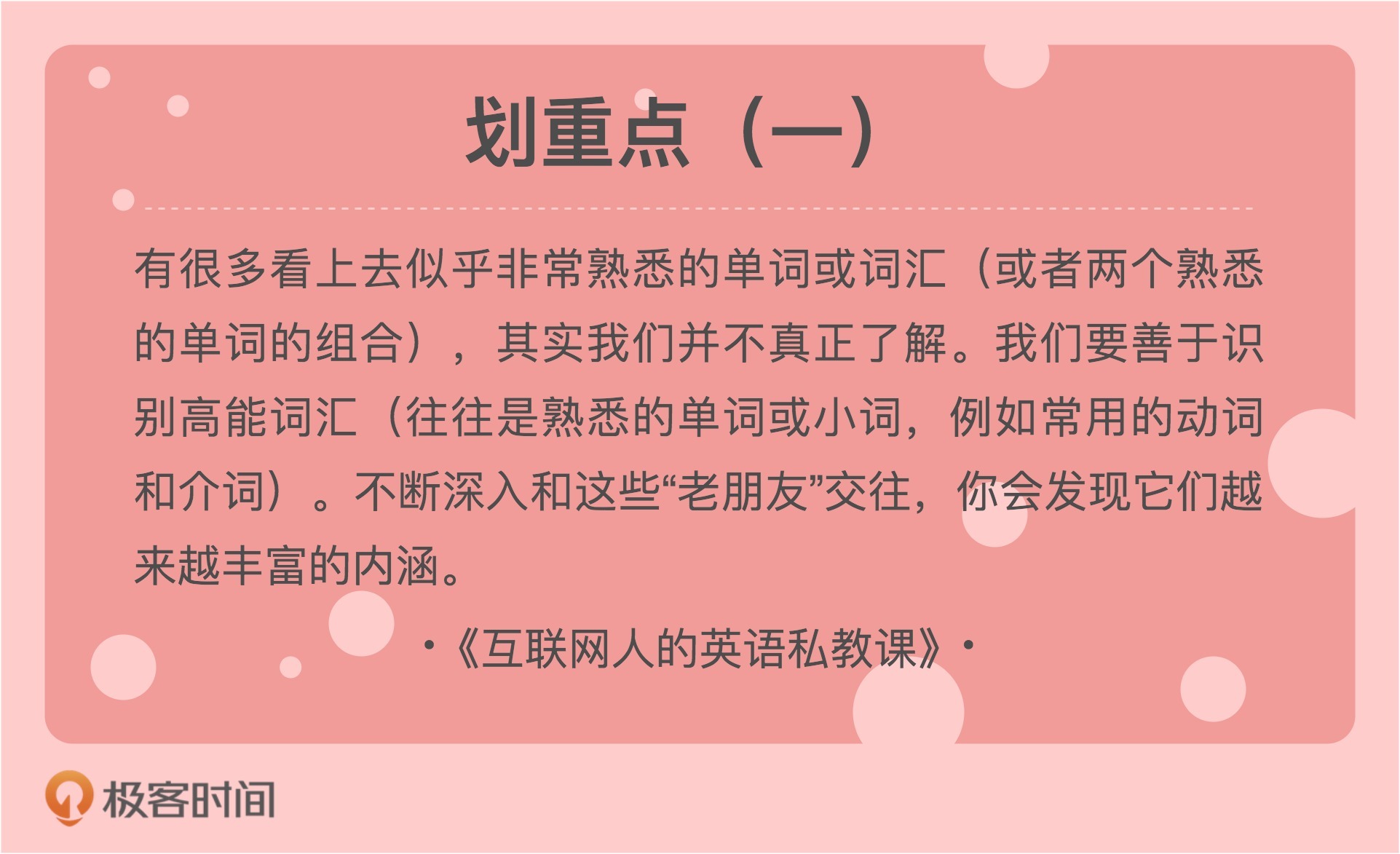
|
||
|
||
### 2.introvert vs. extrovert
|
||
|
||
这是一对反义词(antonym),指“内向的人”和“外向的人”。在查词典的时候,无论查哪一个,一般词典都会提示你另外一个。我们不要放过这样举一反三的学习机会,先一起来看一下朗文词典的解释:
|
||
|
||
* introvert: someone who is quiet and shy, and does not enjoy being with other people
|
||
内向的人:安静、腼腆、不喜欢与人交往的人;
|
||
|
||
* extrovert: someone who is active and confident, and who enjoys spending time with other people
|
||
外向的人:活泼、自信、喜欢与人交往的人。
|
||
|
||
|
||
有的词典不仅会提示反义词,还会提供同义词或近义词(synonym)的链接,对于中高阶学习者来说,这也是一个拓展词汇量的好来源。
|
||
|
||
在麦克米兰词典中,这两个词条就分别带有同义词的链接。
|
||
|
||
例如,introvert词条下有一个[同义词链接](https://www.macmillanthesaurus.com/topics/people-who-are-shy-or-prefer-to-be-alone),小标题是“People who are shy or prefer to be alone”。这里面罗列了所有表示同样意思的单词或短语。
|
||
|
||
extrovert词条下也一样有一个[同义词链接](https://www.macmillanthesaurus.com/topics/people-who-are-confident-boastful-or-arrogant),小标题是“People who are confident, boastful or arrogant”,同样也罗列了所有同样或意思相近的单词或短语。如果有兴趣的话,你可以尝试阅读一下,看看这是不是适合自己的学习方法。
|
||
|
||
需要特别注意的是,一个词的反义词往往是唯一的,但同义词(准确来说应该是近义词)是多样的。但是,其中很多所谓的“同义”,其实在含义、语气、用法等方面存在微妙的区别(例如extrovert的同义词中有很多是贬义的,表示一个人傲慢、自视甚高等),并非每一个同义词都可以互相替换使用。这里你需要特别注意分辨同义词或近义词之间的区别。
|
||
|
||
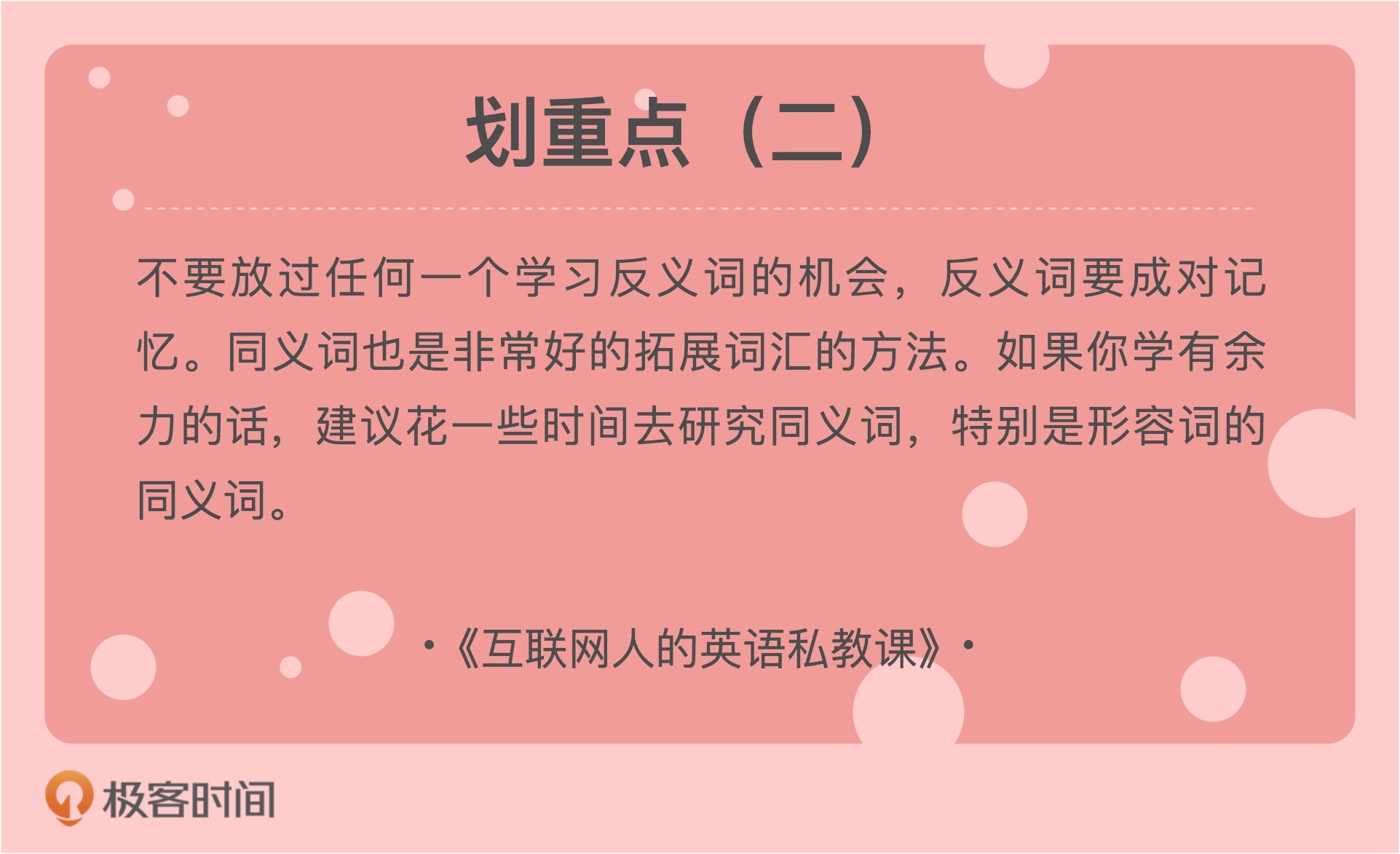
|
||
|
||
### 3.communicator
|
||
|
||
在阅读理解上,这个词本身对于你来说应该没有什么困难,因为你肯定认识communicate这个动词,可以猜得出这个词是communicate的名词形式,表示“沟通的人”。
|
||
|
||
我们在学习词汇的时候,要慢慢养成一个好习惯,就是认识一个词之后,学会同时去了解这个词的大家庭。就像你以前认识communicate这个动词,成为了好朋友,今天阅读一篇文章看到communicator,和communicate这个动词长得很像,猜大概这是它的名词弟弟,然后也和他成为好朋友,然后你就习惯性地想要去了解他更多的家庭成员,例如形容词妹妹。
|
||
|
||
查阅朗文词典,你会发现,无论是查communicate还是communicator,单词下面都会有一个黄色的小框提示“Word family”,这个“单词家族”的标签后面会罗列所有相关的词汇,包括:
|
||
|
||
* 名词 (noun) communication communicator
|
||
* 形容词 (adjective) communicative ≠ uncommunicative
|
||
* 动词 (verb) communicate
|
||
|
||
对于不熟悉的家族成员,我们需要通过英文解释和例句去深入了解它们,熟悉其用法。例如,多读几个例句之后,我们会知道communicator本身是中性词,只是表示一个在说话交流的人,如果要说一个人“善于沟通”“有说服力”等,可以在前面加上形容词,说某人是个good/skilled/convincing/persuasive/compelling/effective communicator。同样道理,如果说某人“不善沟通”,可以说他是个poor communicator。你可以看下面这个例句。
|
||
|
||
例句:Many employees complain that their bosses are poor communicators and bad at giving clear instructions.
|
||
翻译:很多员工抱怨他们老板不善于沟通,无法下达明确的指令。
|
||
|
||
我们再来通过英文解释和例句看一下communicative和uncommunicative的用法。
|
||
|
||
由动词变来的形容词最基本的含义一般都和这个动作有关,communicative有两个含义。第一条解释是able to talk easily to other people,是“乐意沟通、愿意交流”的意思。第二条解释是relating to the ability to communicate, especially in a foreign language,是“和语言沟通能力有关的,特别指外语沟通能力有关的”。词典会同时提示communicative的反义词是uncommunicative。
|
||
|
||
查阅词典后我们可以发现,这个词一般是贬义的。我们来看一段英文解释:If you describe someone as uncommunicative, you are critical of them because they do not talk to other people very much and are unwilling to express opinions or give information.
|
||
|
||
我们一起来看几个例句。
|
||
|
||
例句:He emphasized that managers had to be more communicative with their staff.
|
||
翻译:他强调,管理人员要加强与员工的沟通交流。
|
||
|
||
例句:The test evaluates students’ communicative skills.
|
||
翻译:该项测试主要考核学生的沟通能力。
|
||
|
||
例句:My daughter is very difficult, uncommunicative and moody.
|
||
翻译:我女儿很难相处,不愿跟人交流,又非常情绪化。
|
||
|
||
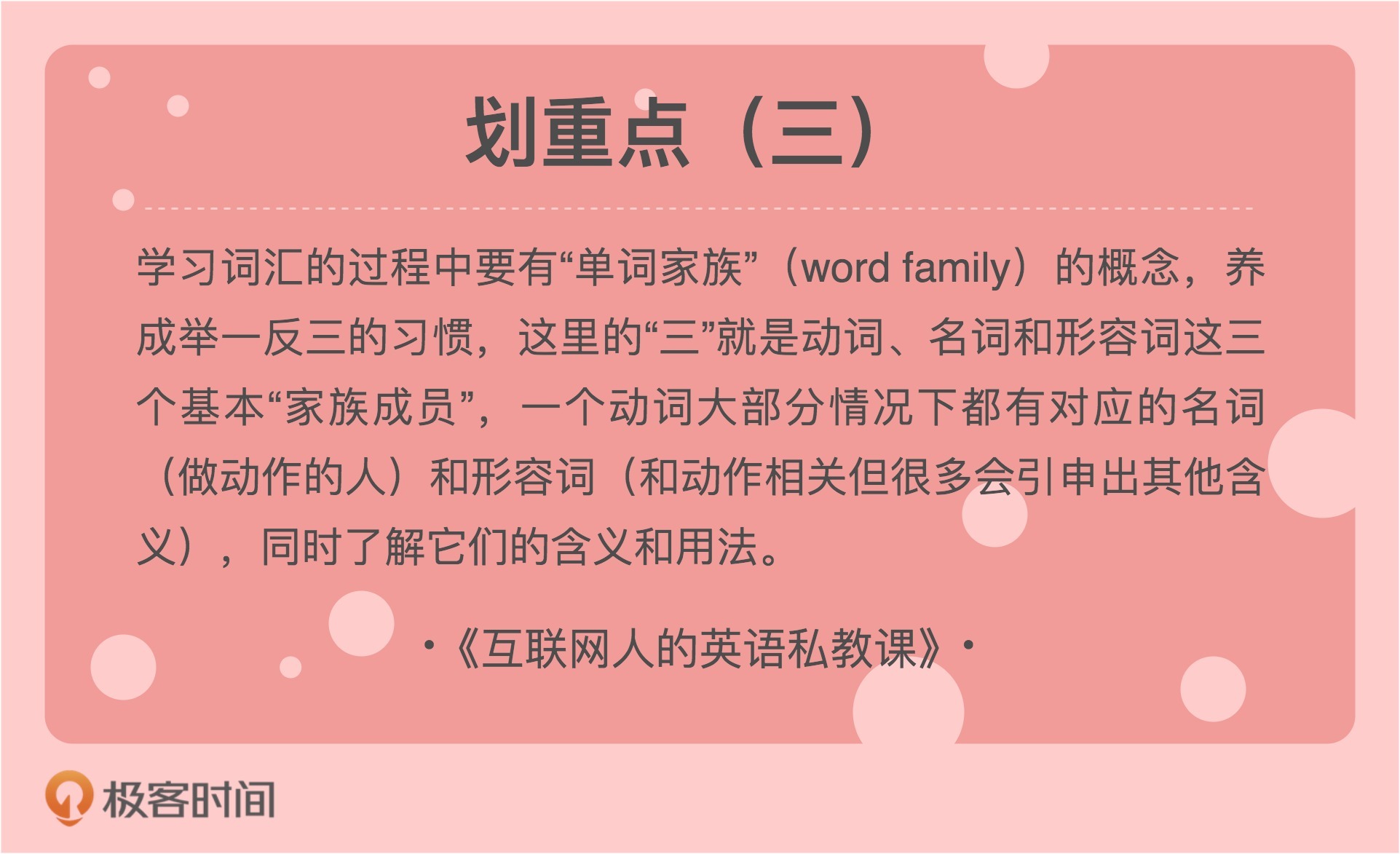
|
||
|
||
### 4.Susan Cain
|
||
|
||
一篇文章读下来,我们经常会碰到一些专有名词,比如人名、地名、公司名、某个朝代或史前地质年代。我曾经的坏习惯是对这些专有名词视而不见,反正我知道那是某个人、某条河、某个公司或者某个年代就行了,至于里面的张三李四、什么具体的山脉、那家公司干什么的或者那个朝代大概是什么时间概念,往往没有兴趣去深入了解。因为我总觉得,即使不了解这些专有名词,也不会影响对这段话基本意思的理解。
|
||
|
||
后来,慢慢地我发现,这其实是个坏习惯,以至于让我错过了很多非常好的学习机会。一个人在自己的文章或书籍中引用其他人的话或者事迹,往往证明这个人是非常重要的,非常值得我们花时间去搜索一下。
|
||
|
||
通过搜索,我们会知道苏珊·凯恩(Susan Cain)毕业于普林斯顿大学和哈佛大学的法学院,曾经是一位出色的律师,后来成为一名社会活动家,创立了一个叫做“安静的革命”([Quiet Revolution](https://www.quietrev.com/))的社会运动,她的著作《安静的力量:内向孩子的秘密力量》(Quiet Power: The Secret Strengths of Introverted Kids)和《安静:内向者在一个滔滔不绝的世界中的力量》(Quiet: The Power of Introverts in A World That Can’t Stop Talking)畅销不衰。这些信息都足以让我们更加深入地去了解一个人和她的思想。
|
||
|
||
我觉得产生这个坏习惯的根本原因是心态问题,归根到底是学习不求甚解、懂个大概就好的毛病,最后一篇文章或者一本书看完,再和别人谈起,只能似是而非地讲述一个大概,很多干货却基本忘记了。因此,在之后的阅读过程中,我们可以刻意去查一查这些专有名词,说不定会有不一样的收获。
|
||
|
||
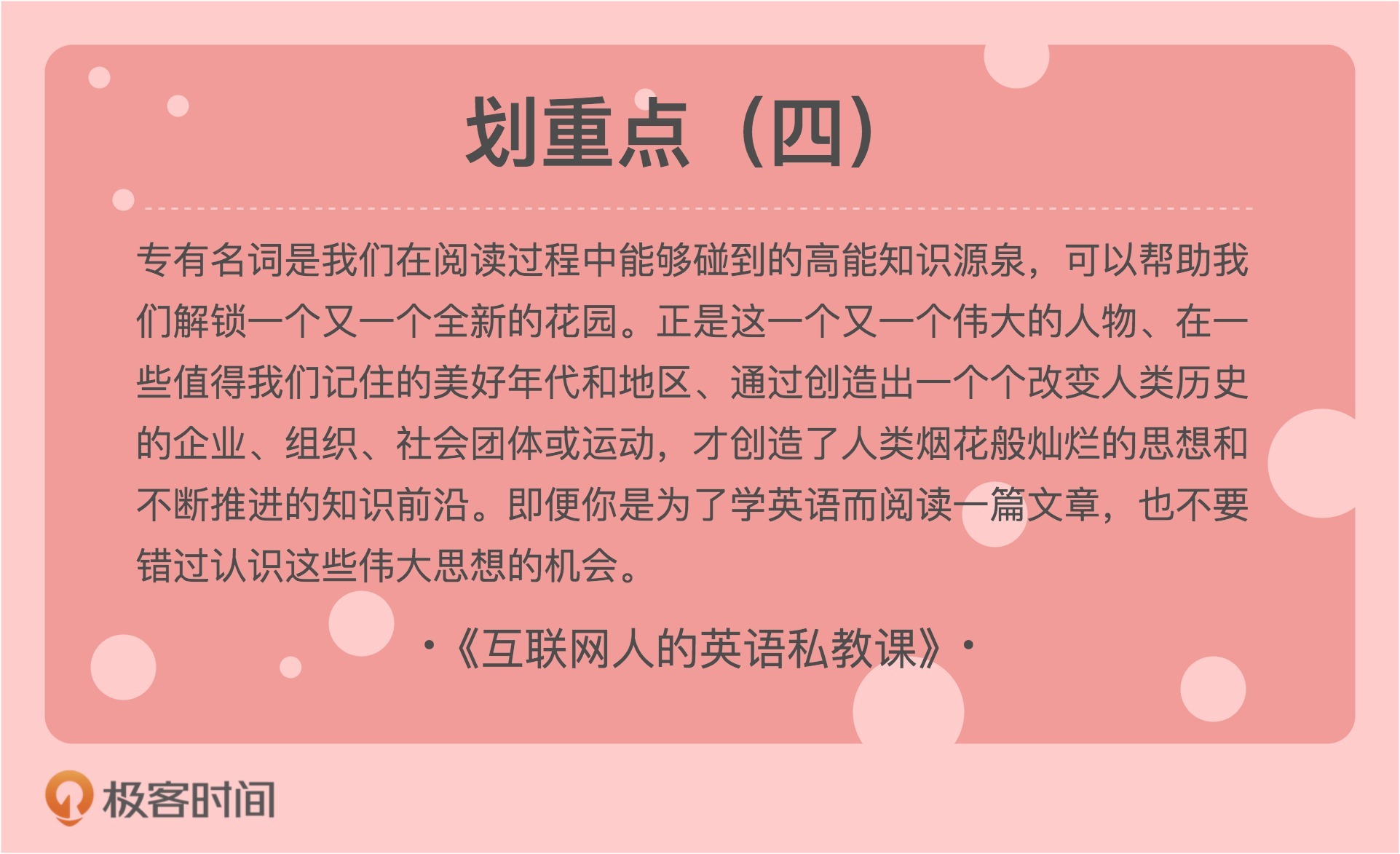
|
||
|
||
## 小结
|
||
|
||
好了,短短两段话,看似普普通通,阅读的时候或许一眼就扫过去了,其实里面还是藏着很多语言精华的。今天我们只讲了四个词汇,下节课我们再讲五个词汇。
|
||
|
||
正如我一开始讲的,词汇本身并不是主要目的,我希望通过学习这些词汇,帮你梳理一下英语词汇学习的要点。首先,英语词汇学习的唯一有效途径只有一个,就是阅读,reading、reading、reading。重要的事情说三遍。其次,英语词汇学习要日积月累,并且不断复习和应用,repeat、repeat、repeat。
|
||
|
||
最后,像之前一样,我给你准备了一个简单的连线小游戏,你可以在大脑中把左右两列对应的项连起来。你可以通过这个过程,回顾这些词的使用场景。
|
||
|
||
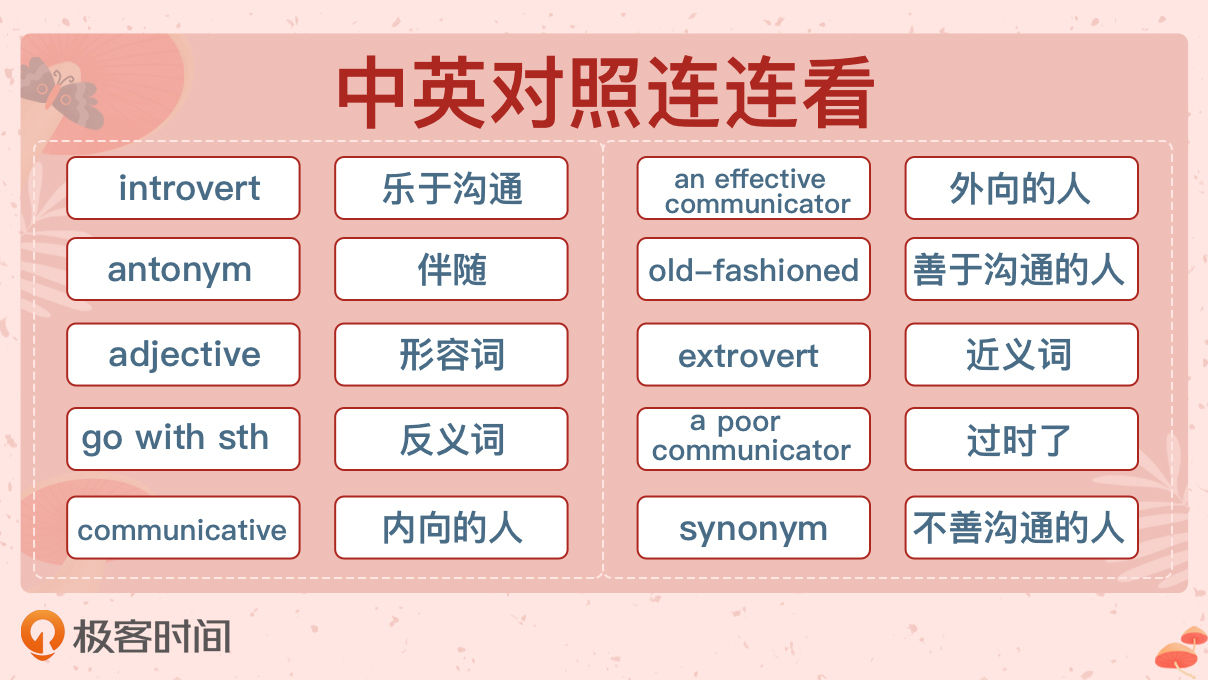
|
||
|
||
## 课后作业
|
||
|
||
1.这是苏珊·凯恩2012年在TED上的演讲“[内向性格的力量](https://www.ted.com/talks/susan_cain_the_power_of_introverts)”。这个视频已经被观看了近2600万次,成为有史以来最受欢迎的演讲之一。ted.com上几乎所有的演讲都配有多个语种的脚本(包括简体和繁体中文以及英语),是非常好的练习听力和阅读的学习材料。
|
||
|
||
2.利用我今天讲过的概念和方法,自学本文第二部分的词汇。我同样对前两段的重点词汇做了加粗。你可以用我们今日的方法来学一学下面这些词汇,然后我们一起在留言区讨论词汇学习的心得体会。
|
||
|
||
> **Myth: Engineers Don’t Make “Natural” Leaders**
|
||
|
||
> This myth follows an even more **generalized** myth that leaders are **born**, **not made**. Research on leadership development suggests that this simply is not true, and in fact 70 percent of leadership ability is the result of lessons learned through life experiences.
|
||
|
||
> A foundational concept of leadership development is often referred to as “leadership **readiness**.” It is a belief inside someone that they are truly ready, willing, and able to become a leader. People who believe this about themselves can develop much more quickly, and this isn’t surprising. This idea is very much in-line with other research done by **Carol Dweck** about having **a “growth” mindset versus a “fixed” mindset** so that we believe we can continue to develop and change throughout our lives.
|
||
|
||
> **Assess Your Strengths**
|
||
|
||
> One of the ways to discover that we are capable of leadership is to identify the strengths that we have and find ways to utilize them. There are a lot of free and paid assessments out there, such as CliftonStrengths by Gallup to help you do this, but a very simple approach is to ask people who know you well.
|
||
|
||
> Go ahead – ask the ten people in your life who know you better than anyone else what they think your top three personal strengths are. Likely, you will agree with a lot of what they say. They may also share with you things that you don’t currently believe about yourself, but because others are suggesting it, you may start to believe a little bit more.
|
||
|
||
> **Crushing Limiting Belief Activity**: This may seem a bit weird, but stay with me. Take about five minutes and jot down a quick list of what you consider to be your weaknesses. Then grab a piece of paper or note card and write down each of those “weaknesses” that you identified that is actually a limiting belief. Take that paper with the list of limiting beliefs and rip it up. Throw it into the air. Make a mess. Show those beliefs you don’t accept them. For example, my weakness might be that I tend to suppress my emotions which can lead to less connection in my relationships. A limiting belief I used to accept was that I was not a good writer. You may or may not agree with that, but at least I am pushing through and practicing my skills! I would write that on a note card and rip it up. I promise, it feels good.
|
||
|
||
> **Look Inside**
|
||
|
||
> The fact of the matter is that people rarely make huge changes in their lives, but people do change. It happens when we can increase self-awareness and have “ah-ha” moments or epiphanies that help us see ourselves and our situations in a new light. That’s really how we change our mindsets, which then drives our behaviors in new ways.
|
||
|
||
> I’ve seen people who were so bent on blaming others that they became so toxic and were about to be fired. Yet they were able to create just enough space to realize they were part of the problem and began focusing on what they could change, rather than blaming everyone else. It’s transformational.
|
||
|
||
> **Mindset Adjustment Activity**: Identify the largest work challenge you are facing right now. Write down what you think the root cause of the problem is. Then, write down 2-3 things you can do personally to make things better (this is not about you taking action to fix other people – focus on you). Then, stay focused on your own ability to help the cause rather than what others are/aren’t doing.
|
||
|
||
如果在学习中有什么问题,你可以在留言区提问,同时欢迎你把学习心得分享出来,我们一起每天进步一点。
|
||
|